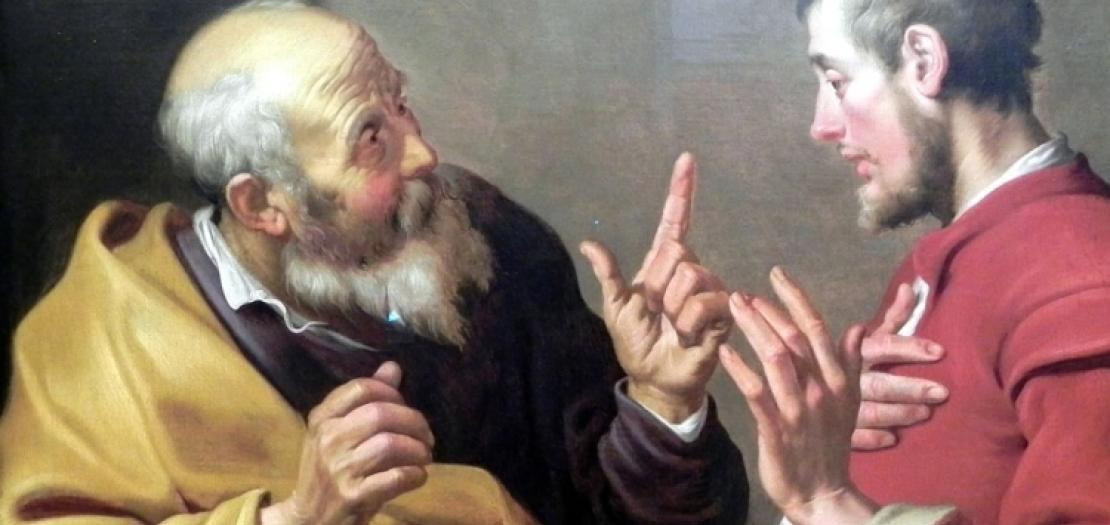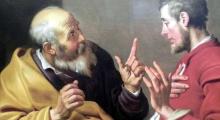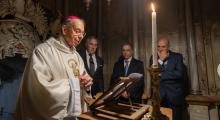Issued by the Catholic Center for Studies and Media - Jordan. Editor-in-chief Fr. Rif'at Bader - موقع أبونا abouna.org

Following is the text of the meditation by His Beatitude Cardinal Pierbattiasta Pizzaballa, Latin Patriarch of Jerusalem, on the 25th Sunday of Ordinary time, dated September 21, 2025:
Today we hear one of the most puzzling parables told by Jesus. (Luke 16:1-13)
It is the parable of the dishonest steward who, expecting to be fired for not handling his master's wealth properly, finds a way to get away with it anyway so as not to be left without support and possessions.
This parable follows on directly from the parables in the previous chapter, the parables of mercy, the last of which is the well-known parable of the merciful father or the prodigal son. There seems to be a continuity, because the beginning of our parable starts with “also”: “Then he also said to the disciples. (Luke 16:1)
Several elements also recur in both accounts and establish a connection, especially between the parable of the merciful father and the one we read today.
The first is given by a verb that plays a central role in both stories, namely the verb “to squander.” (Luke 15:13; Lk 16:1) The son squanders his father’s inheritance, the steward squanders his master’s property.
Both eventually come to their senses and look for a way out of the extreme predicament they find themselves in. Finally, the image of home returns in both parables: the younger son thinks back to his father’s house, the corrupt steward devises stratagems so that someone will take him in when he is unemployed. (Luke 16:4)
What seems puzzling in this parable is the fact that the focus is on a man who behaves inappropriately but serves as an example. However, the example is not his unfaithfulness, but his ability to act wisely and find solutions quickly and effectively.
The protagonist of the parable represents the classic type of man, of humanity, with no exception: we are all a little dishonest, in the sense that we all somehow squander the gift of grace that is bestowed upon us. We accept part of it, and part of it we let go without it transforming our lives.
If we admit this to ourselves, it can help us to look for the way to return to ourselves, like the younger son, or to sit down and think about how we can fulfill the task of our lives (Luke 14:28-32) despite all our little unfaithfulness, despite all our squandering.
For the younger son, the way to understand this was to return home and to discover a new face of his father, a father for whom one never ceases to be a son.
For the steward in today’s parable, the way was to seek out brothers and make friends.
He used some of his master’s possessions to get out of his own loneliness, out of the isolation into which his own greed had relegated him, and so create a network of people who could be benevolent to him.
Obviously, he is only doing this out of opportunism, but in reality the real trick is just that: to understand that this is exactly what we need, someone to help us carry the burden of our lives.
It is significant that the steward, in order to make friends, forgives the debts of his master’s debtors, (Luke 16:5-7) that is, he lightens the burden that has crushed these people. So this is the way to forgive each other’s burdens, to help each other carry them, to make each other’s lives easier.
It is not for nothing that Jesus says that by doing this we do not open the door to our earthly home, but to our heavenly home: “Make friends for yourselves with dishonest wealth, so that when it fails, you will be welcomed into eternal dwellings.” (Luke 16:9)
The door to the Father’s house is therefore entrusted to us, to the extent that we know how to contribute, especially by helping to lighten the many burdens that each person carries.
So, the Son has found the door to the Father’s house, the steward to his brothers'.
Only to find that it is one door.
+ Pierbattista







